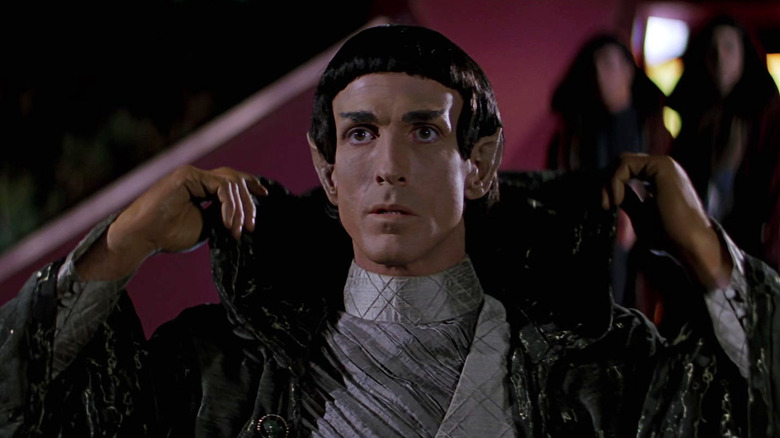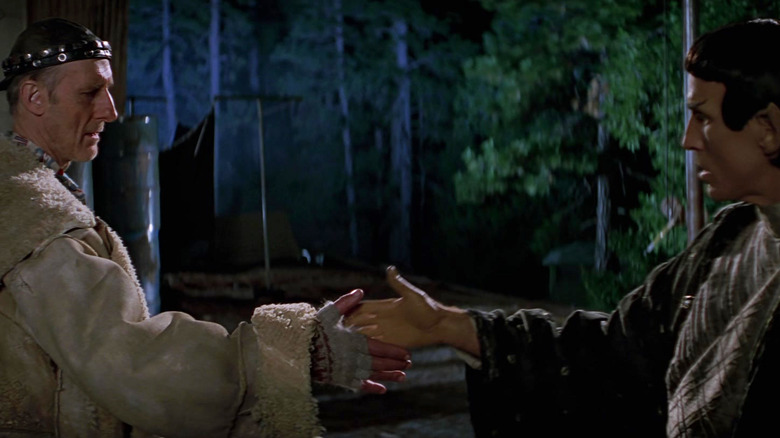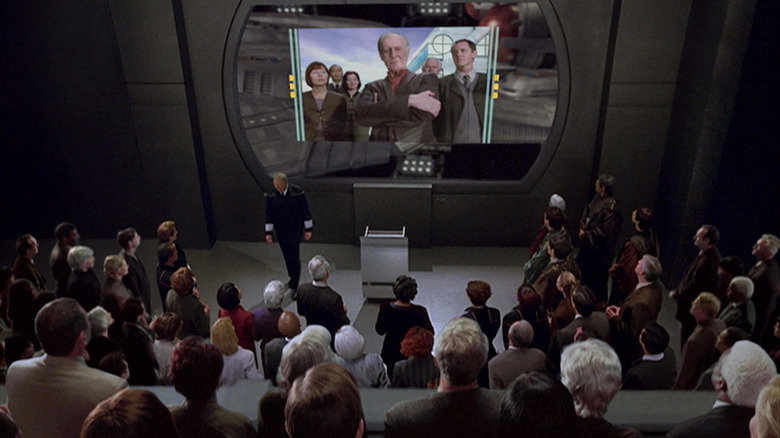In A Year As Hopeless As 2025, Star Trek Is The Best Pop Culture Medicine
It is 2025, and it feels like the bad guys are winning. Humanity is witnessing, just outside our windows, a steady and inexorable march toward fascism. The worst examples of humanity are actively and shamelessly re-writing the rules to their own selfish, money-grubbing, cruelty-inspired whims, and there seems to be little we can do to stop it. Corrupt billionaires are stripping the United States government for parts, all in the name of giving themselves more tax cuts.
Additionally, our rights are being stripped away swiftly and steady. Vulnerable groups are being pointedly ignored and actively placed back at risk. This is all being done because it's too much work for stone-hearted politicians and their sadism-fueled followers to learn what "compassion" means. There are undercurrents of eugenics and white supremacy flowing from the most powerful people on the planet. It's 2025, and we're in a dark, dark place.
Of course, we have the "Star Trek" franchise to remind us all hope isn't lost. Indeed, "Star Trek" will always be there, resting in the background, reminding us to feel hope. And not just a vague, blandly inspiring sense of hope — most blockbuster entertainment has a hopeful, happy ending — but a very palpable, workable theory of our survival. In fact, there's a very basic idea baked into the fictional history of the "Star Trek" universe: The bad guys won't win in the end. As "Star Trek" creator Gene Roddenberry once imagined it, humanity will need to encounter its near-extinction before realizing its utopian future ... but the utopian future is our logical conclusion.
But "Star Trek" is no mere balm or escape in dark times; again, most blockbusters provide a winsome sense of hopefulness. Instead, the space opera property actually provides a blueprint as to how we should behave in a year like 2025. Roddenberry may not have intended to create an all-purpose survival tool in 1966, but right now, "Star Trek" feels especially important.
The future history of Star Trek is as dark as the present
"Star Trek," as Trekkies love to expound upon, is a utopian text. "Star Trek: The Original Series" is set in the mid 22nd century on board the USS Enterprise, a high-powered space vessel on a mission of exploration. The bridge of the Enterprise is populated by humans of different nationalities — and even a notable space alien — working together efficiently and professionally. Nationalism is gone. People hail from different countries, but they are all united now, unaffected by outmoded notions of nationalism or patriotism. What's more, the miracle technologies of "Star Trek" are used not to dominate or conquer but to aid in missions of diplomacy and research. We've not only united in terms of our government, but we have also agreed to use our scientific advancements for the overall benefit of the galaxy. No one owns it. There's no money in the future. Food replicators have eliminated hunger and want is no longer our primary driving force.
It's worth remembering, though, especially in the year 2025, that the utopia of "Star Trek" wasn't naturally developed. Rather, crisis forced it upon us.
As dramatized in the 1996 film "Star Trek: First Contact," humanity's utopian chapter didn't begin until we made contact with an alien species for the first time. "First Contact" is a time-travel movie featuring the cast of "Star Trek: The Next Generation," but it takes place primarily in the year 2063, centuries prior to the main events of that show. There, on Earth, an engineer named Zefram Cochrane (James Cromwell) has invented the very first faster-than-light engine. While testing it, he attracts the attention of some Vulcans who happened to be passing by. They land, and humans learn they aren't alone in the galaxy, causing a sea of change to occur.
However, this all happens after humanity has suffered through multiple devastating world wars that nearly wipe us out. We're going to make it and will head out into the stars, but, by Roddenberry's own theories, we need to be forced to our knees first. We need a reckoning before we can unite. 2025 feels like a reckoning.
A brief history of Star Trek
Roddenberry, recall, created the "Star Trek" franchise as a direct response to what he was seeing in the real world. He looked out his window and saw wars, racism, corruption, nationalism, and humanity's grievous sins. He was an adult during World War II, having been born in 1921. Roddenberry witnessed humanity betraying itself. He, as a response, created a fictional universe where all those problems had been solved — where we, as a species, had learned to finally put aside our differences and work together. We didn't do so for profit, but to become better, wiser, more compassionate, and more open-minded.
But he wasn't so optimistic to feel that we could naturally push ourselves in that direction, merely because we liked the idea. No, we had to come within a whisker of extinction first. Roddenberry was living in a dark, hopeless time of violence. It seemed unlikely the people of Earth would just wake up one morning and decide to put down their weapons and money. Something horrible had to happen to us first — something bleak and destructive.
In the "Star Trek" universe, humanity engages in the Eugenics Wars, a conflict wherein genetically altered, racially "pure" beings become global dictators. This, at last measure, took place in the mid-21st century. The Eugenics Wars then dovetailed with World War III, with a destructive nuclear attack wiping out the bulk of the planet. From the 2050s through the 2070s, humanity was holding on by a thread and surviving in post-apocalyptic shanty towns. Notions of genetic "purity" and violence led us to the brink. Billions wound up dying.
And that's where we might be in 2025 — at a place where eugenicists and violence-mongers are in charge. "Star Trek" reminds us, though, that the horrors will never persist, and the evils of the past will be lessons for us. It also reminds us, optimistically, we will learn, grow, and reconstruct ourselves ... and actually be better at the end of it.
Things are bad now, and they may get worse, but "Star Trek" promises us that we will certainly rebuild — not only that, but rebuild a utopia. It's an important message for 2025.


